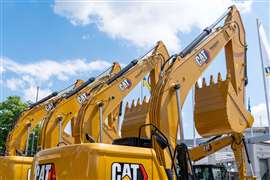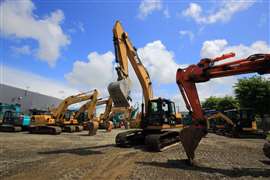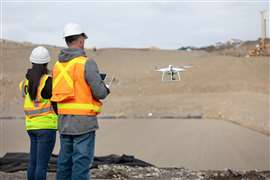What lies beneath Lavendon?
07 May 2008
Lavendon Group (Nationwide Access in the UK, Zooom most other places) is Europe's largest powered access rental company, with over 21000 machines. The company's growth over the years, and its successful London Stock Market flotation in the mid 1990s, have showed that a powered access specialist can be backed, financed, and can provide a respectable stock market return.
The Group has acquired several access rental companies in different countries over the past few years, and most recently the proposed acquisition of The Platform Company in the UK and DK Rentals in Belgium, France and Spain. Were these acquisitions expensive, and how do they compare to the Lavendon's own performance? And what has been happening to Lavendon's share price?
For DK Rentals, Lavendon paid a headline figure of €87.8m for those companies, plus some €25m of debt which came along with the businesses.
2006 EBITDA (earnings before interest, tax, depreciation and amortisation) for DK Rentals Spain was €6.427m, total acquisition price is €24.2m (including cash and some Lavendon shares), plus assumption of €11m of debt, which totals €35.2m. This puts the trailing (last year's) EBITDA multiple at a reasonable 5.47, similar to Lavendon's other acquisitions. €3.6m of the consideration is deferred (and probably conditional on performance) for 12 and 24 months, helping cash flow and perhaps risk as well.
For DK Belgium and France, 2006 EBITDA was €10.870m, total acquisition price of €63.6m plus €15m assumed debt totals €78.6m, placing the EBITDA multiple at a substantially higher 7.23. However, it is probably fair to place a higher premium on a market leader in Belgium over a younger business with less market share in Spain. Again, some of the consideration is deferred and probably conditional on performance.
The Platform Company in the UK
The acquisition price of £46.1 m, plus £33m debt totals £79.1m total consideration. This puts the trailing EBITDA multiple at 6.41 times, which is in line with the prices paid for Lavendon's other acquisitions. Quite a bit of the consideration is deferred for one to three years; about half is in Lavendon shares. Unlike the owners of DK, who saw their new Lavendon shares shrink in value by 40%+ in six months, The Platform Company shareholders are guaranteed a minimum price for the shares issued on the anniversaries.
EBITDA is operating cash flow; the earnings made before subtracting interest, depreciation and amortisation, lease and financing payments, and taxes. As shown in Access International September 2006 issue, the EBITDA multiple calculation is a useful way of comparing rental companies with different profitability, depreciation policies and debt levels.
A few caveats are always in order as we try to compare numbers based on press releases, which can have an element of “spin”. The first rule of looking at numbers from the outside is that we commentators rarely know the whole story, and often have to make estimates to try to compare “apples with apples”. As we cannot yet see the numbers for the acquired companies for the past few months, perhaps the EBITDA multiples of 5.47 times, 6.41 times and 7.23 times have moved a great deal, as the UK, Belgian and Spanish rental markets are still growing.
How do the targets compare to Lavendon's own business?
One of the most important comments in Lavendon's DK acquisitions press release is that both of the DK rental businesses had EBITDA / sales ratios higher than Lavendon's. In 2007, Lavendon's EBITDA was 34.4%, while DK Belgium and France was 53.3%, and DK Spain was an even higher 58.8%. Lavendon explained this was due to increased leverage and scale, due mostly to DK's larger depots.
Lavendon's own profitability is starting to feel the benefits of the acquisitions, with 2007 showing £18.9m pre tax profit on revenue of £186m. This has finally passed its previous record of £8.5m, which dates from 1999, when the company had quite a bit less fleet – and debt, and 1999 turnover was £45.2m.
Share Price Decline
The company has seen a decline in its share price since the summer of 2007, from a peak of 732p per share to less than 300p in January. The company's current (March 20) market capitalisation is actually only £132m, which is awfully close to its balance sheet “break-up” value of £119m. Although an article in the February 6 Contract Journal asserted that “Lavendon's level of debt worries City”, I believe that the low share price is mostly investor nervousness affecting many equipment companies (more in KHL's International Rental News March 2008)
How is Lavendon doing in the UK compared to its other markets?
The good news about these acquisitions is that DK's Belgian/French 2007 pre-interest, pre-tax profit of £6.667m is more than Lavendon made in 2007 in any of their markets except the UK. This is despite Lavendon's leadership in the German market and turnover of £48m.
One comment in the small print of the interim 2007 report says “Note information disclosed for the UK operation includes centralised group costs which may relate to the operation and financing of overseas subsidiaries.” Is Lavendon's UK profitability still “carrying” its other operations after ten years in Germany, and over six in France and Spain?
The Middle East operations are the most profitable in the group on a percentage basis; perhaps Lavendon wishes it had invested more in “exotic” markets to the east over the past ten years rather than in Germany?
I believe that Lavendon has acquired excellent companies in the past years, plus one bargain (Wizard Workspace), and while it has paid reasonably high prices (5 to perhaps 7 times EBITDA), a substantial portion of the consideration is deferred (and linked to future performance) and some in shares, both of which lower Lavendon's risk. Lavendon's profitability has completely turned around since its £14m loss in 2003 (most of which was in Germany). Lavendon's share price, however, has declined by over 50% since June. Judging by the similar declines in share prices in other large rental companies, this is not a reflection on Lavendon or the acquisitions, rather that many investors have decided to sell construction equipment manufacturer and rental shares the minute the word “recession” is whispered.






